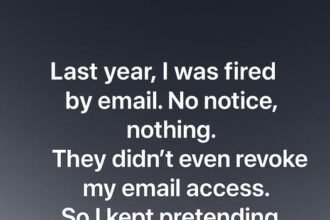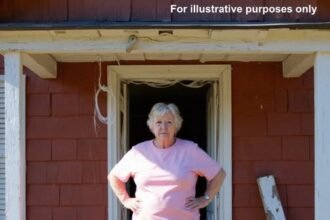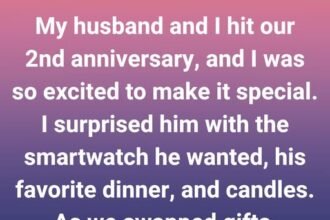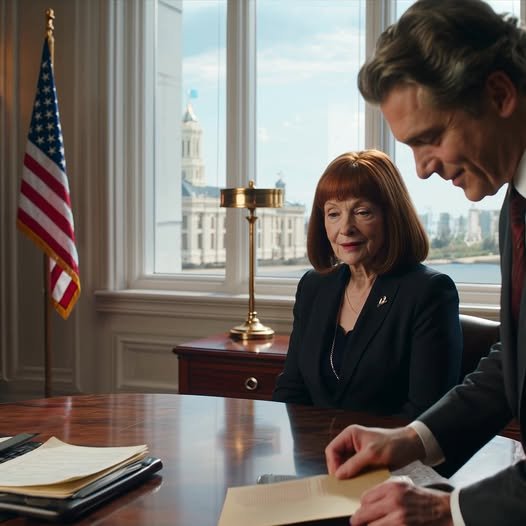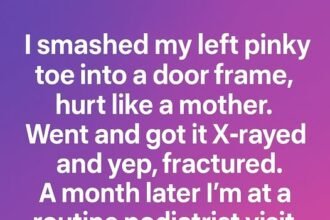“Give him time, Ellie,” he’d say, pulling me close in the quiet of the evening. “He’s a good boy. He just needs time.”
I gave him years.
Still, Noel grew into the habit of polite distance. He graduated from law school, married Camille, had two children, and learned to hide his dislike behind manners in front of his father. Howard—so perceptive in business—seemed not to see it, or pretended not to.
In recent years, though, I’d catch a pensive glance when Noel found an excuse to skip a family dinner, or declined to introduce me to his partners. “You know, Ellie,” he said not long before he fell ill, “sometimes I think I spoiled Noel too much.”
“You were a father trying to fill a void,” I answered. “There’s no perfect way to do that.”
He nodded, but his eyes were far away.
In the closet, I found the file folder Howard had asked me to keep separate from the business papers. “Just in case,” he’d said, with an odd determination in his eyes. Inside were copies of deeds, bank account information, and an envelope with my name in his angular hand.
He’d asked me not to open it until it was needed. I had laughed at the time, and so had he, dark humor passing between us with the easiness of people who believed they had time. We did not.
Three weeks earlier, a heart attack stole him—sudden and unrelenting. I was there holding his hand when the ambulance arrived. “I love you, Ellie,” he managed, squeezing my fingers.
And then he was gone. The days that followed were a blur of casseroles and condolences, lilies and legalities. Noel took over the arrangements.
For that, I was grateful; I could hardly string thoughts together. My body walked through rooms while my mind sifted through twenty-five years—morning coffee in the kitchen, his laugh in the car, the way he would read at night with his glasses sliding down his nose. The house still smelled faintly of his aftershave and the peppermint mints he kept in his pocket.
His clothes were in the closet, sleeves curved as if his arms still lived inside them. When I tried to sort his things, I ended up on the dressing-room floor with one of his sweaters pressed to my face, sobbing harder than I had at the funeral. Grief is a private animal; it hides when the house is full and comes out when you are alone.
The phone rang. Martha, my closest friend and a fellow counselor from school. “How are you, dear?” she asked, worry softening her voice.
“I’m hanging in,” I said. “The will is today.”
“Do you want me to come?”
“Thank you, but it’s family and the notary. I’ll be fine.”
“Will Noel be there?” Her tone tightened.
Martha had watched the slow war of attrition between Noel and me for years. “Yes. And Camille and the kids.”
“Keep me posted.
And remember—I’m here.”
After we hung up, I stood by the window. Rain tapped a little faster on the garage roof. Across the street, Noel’s black SUV idled.
I hadn’t heard it pull up. Camille climbed out first, elegant in a dark blue dress, umbrella opening with a practiced flick. Quentyn and Laurel followed, faces solemn.
They did not walk to the house. Instead, they turned toward town. Breakfast, I thought.
Even for the reading, even after his father’s death, Noel would not cross my threshold without necessity. I made tea in the kitchen. The note on the refrigerator—his grocery list from the day he died—was still taped there, his block letters steady as ever.
I could not take it down. As long as that note remained, some small piece of him lived in the room with me. On my way to the notary, I stopped at the cemetery and arranged a bouquet of white lilies on his grave—his favorite flowers.
The rain had softened into a mist. Birds stitched thin music across the sky. I stood with a hand on the cool stone and said the only words that felt safe.
“I miss you,” I whispered. “Every minute. Every second.”
The caretaker, an older man with kind eyes, approached, hat in his hands.
“Mrs. Hollister,” he said with a small bow. “He was a good man.
Always greeted me, asked about my knees. Not everyone sees us.”
“Howard did,” I said, swallowing. “He saw people.”
“That’s rare,” the caretaker murmured.
He stepped back and let me be. Bramble & Associates occupied the second floor of an old brick building in downtown Everglade. I’d been there before—wills, deeds, the slow paperwork of life.
Aldis Bramble had often come to our home, but today demanded formality. Mrs. Pierce, the secretary, greeted me with a sympathetic smile.
“Mr. Bramble is expecting you, Mrs. Hollister,” she said, ushering me into his study.
“Tea or coffee?”
“Tea, please. Lemon, if you have it.”
Aldis rose when I entered. He was in his seventies, posture unbent, gray hair and neat beard giving him the gravitas of a portrait.
He shook my hand with both of his. “Eleanor,” he said warmly. “It’s good to see you, though I wish the reason were different.
Howard was not only my client—he was my friend.”
“Thank you, Aldis,” I said, grateful for the informality. Today I did not want to be “Mrs. Hollister.” Today I wanted to be a woman who had lost her husband.
He gestured me toward a comfortable leather chair beside his desk—his chair for conversations, not the stiff visitor seats. He took the chair next to me instead of sitting behind the massive desk. “How are you holding up?” he asked softly.
“Day by day. Sometimes I think it’s getting easier. Then something—his mug in the sink, his watch on the nightstand—and it begins again.”
He nodded.
“Time doesn’t heal,” he said, eyes turning inward. “But it teaches us to live alongside the hurt.”
Mrs. Pierce brought the tea, fragrant with lemon.
The door clicked open again a few minutes later. “Your stepson’s family has arrived,” she announced. Aldis glanced at his watch—seven minutes early—then at me.
I nodded. Noel entered first: tall, trim, an expensive charcoal suit stitched tight across his shoulders. Camille followed in the blue dress I’d seen, the children quiet and uncertain.
Noel hesitated when he saw Aldis and me side by side, our teacups and the easy familiarity between us. His gaze took inventory—my comfortable chair, Aldis’s hand resting lightly on the back of it, the papers on the desk. “Mr.
Bramble,” he said, extending a hand with the confidence of a man who’d negotiated boardrooms. He gave me a curt nod. “Eleanor.” No embrace.
No condolence. A meeting, not a mourning. “Please, sit,” Aldis said, gesturing toward the two plain chairs opposite his desk.
Noel hesitated, then chose the center chair as if claiming a head of table that did not exist, guiding Camille to his right. The children took the outer seats. I remained slightly apart in the comfortable chair, a fact that seemed to irk him without his quite knowing why.
Aldis returned to his desk, but not before giving my shoulder a quick, grounding squeeze. Noel saw the gesture. His jaw tightened.
“We’re all here,” he said. “Can we begin?”
Aldis opened a thick file and perched thin gold-rimmed glasses on his nose. “We are gathered to read the Last Will and Testament of Howard James Hollister,” he began in a formal tone.
“Please refrain from comment until I’ve finished. Questions will be answered afterward.”
I tuned in and out during the preliminary language—the revocation of prior wills, testator of sound mind, the legal incantations that make death legible. Above Aldis’s shoulder hung a stern oil portrait of the firm’s founder, mutton chops like punctuation marks.
He seemed to frown at us from another century. “All of my estate,” Aldis read, “including my home, personal effects, financial assets, and the stock I own in Hollister Pharmaceuticals, totaling approximately twenty-five million dollars, I divide as follows.”
Noel leaned forward, fingers clawing the armrests. Camille straightened.
The children tried to look as if they understood. “I bequeath fifty percent of all of the above estate to my beloved wife, Eleanor Margaret Hollister, as a token of my deep love and appreciation for her years of support, devotion, and wisdom.”
Out of the corner of my eye, I saw Noel’s jaw set; he said nothing. Aldis continued.
“I bequeath the remaining fifty percent to my son, Noel Allan Hollister, with the hope that these funds will be used wisely for the well-being of his family.”
Noel relaxed, shoulders dropping as if he’d finished an uphill run. Camille allowed herself a small smile. Fair, even generous.
I had been Howard’s wife for twenty-five years. Noel was his only child. The math made sense.
The will went on: the interim management of the company by a board of directors chaired by Richard McKenzie; the distribution of personal items; charitable bequests. Howard’s discipline with details showed even here. Then a clause about the house.
“I specifically stipulate that the family home at 17 Maple Street, Everglade, with all furnishings and adjoining land, passes into the full ownership of my wife, Eleanor, regardless of the overall distribution of assets.”
Relief stung behind my eyes. I hadn’t expected that. I had feared the house would be part of the common pool.
Howard knew what this place meant to me—the echoes in every room, the way the light in the kitchen in late afternoon belonged to us. Aldis closed the folder. “Questions?”
“Is this the final version?” Noel asked.
“No changes in the last six months?”
“It is the final version signed six months ago before two witnesses,” Aldis said. “It is properly executed.”
Noel nodded, satisfied with that part of the answer. “Anything else?”
“It’s all contained in what I’ve read,” Aldis said, voice neutral.
“The rest is routine filing.” He turned to me. “Eleanor, I have copies of everything. Call me with anything at all.”
Noel watched the exchange, eyes flicking between us.
The warmth in Aldis’s tone was an invisible transfer of power, the acknowledgment that I was not just a recipient of assets but a person he respected. Camille touched Noel’s arm. “We should go,” she murmured.
“The kids have class.”
Noel stood but lingered. The habit of control dies hard. “Eleanor,” he said, “Camille and I will discuss our share’s management.
I’ll contact McKenzie about a growth strategy. Father’s been conservative. I have ideas.”
“Richard will be glad to hear them,” I said calmly.
He nodded once and led his family out without goodbye. Through the office window I watched them on the sidewalk—Noel animated, hands cutting the air; Camille answering in short slips of speech, both of them energized the way some people are by numbers they haven’t yet cashed. The children stood apart, bored and chilly.
“Don’t think about them right now,” Aldis said, following my gaze. “Go home. Rest.”
“I will,” I said.
I didn’t believe myself. The first call came three days later. Noel, businesslike.
“I’ve spoken with McKenzie,” he said. “We need restructuring. Father delayed changes too long.
We’re losing ground. I want a meeting Tuesday. If you’re not ready for governance, you can assign your voting rights to me.”
Howard had never mentioned rocky numbers.
He’d been proud of the new line of low-cost generics performing well. “I’d like to speak with Richard first,” I said. A pause.
“As you wish,” Noel said, irritation humming under the words. “Don’t say I didn’t offer to help.”
Richard answered on the first ring. “Eleanor, I’m so sorry Noel’s bothering you already.
We’re fine. Stable. We were shaken by Howard’s death, but the fundamentals are sound.
I don’t know what story Noel’s spinning, but it isn’t ours.”
Relief steadied my breathing even as unease slid in through another door. Why exaggerate problems unless the problem you wanted to solve was me? By the weekend, Martha called, voice crackling with town electricity.
“Did you hear? He’s telling people he’ll contest the will. Says Howard wasn’t himself.
Ellie… he’s hinting you manipulated him.”
“Manipulated him?” The word made the room tilt. “I know. No one who knows you buys it.
But he talked to James Howard at the Gazette. Expect ink.”
The Monday edition landed with a thud. “Hollister Family Drama: Son to Challenge Will.” The article was couched in caution, an editorial pirouette done to avoid libel, but the insinuations were there like fingerprints on glass.
The phone lit up with sympathy and curiosity in unequal measure. By evening, Aldis called. “I saw the paper,” he said, outrage tamped down by professionalism.
“I warned Noel that if he defames you we’ll respond. He doesn’t get to rewrite Howard’s character.”
“I don’t want to sue him,” I said wearily. “Dragging this through court would pull dirt over Howard’s memory.”
“We may not have a choice.
Noel filed a petition this afternoon to invalidate the will, alleging undue influence.”
The words settled like iron. I imagined the arguments: me as the counselor-wife wielding dark arts; Howard as a man softened by grief, gullible to suggestion. They were lies dressed in legal language, but lies repeated can become architecture.
The next day a letter arrived from Camille, on expensive stationery embossed with a delicate “C.”
Dear Eleanor,
I’m writing woman to woman. I know you loved Howard and that this conflict would have broken his heart. Noel is grieving and is motivated not by greed but by a sense of justice.
The business is a Hollister legacy. Quentyn and Laurel are Howard’s only grandchildren. Perhaps we could find a compromise to avoid a painful public process.
Noel is prepared to make sure you live comfortably in the home that means so much to you. Sincerely,
Camille Hollister
It was reasonable on its face and ruthless between the lines. Translation: Give up your share.
Keep the house. Stay quiet. I walked through the rooms at dusk, stopping to trace the stories in the photographs: Howard cutting the ribbon at the third pharmacy; the two of us in Italy, flushed and windblown in front of the Colosseum; last Christmas, Howard in the ridiculous reindeer sweater I’d given him, wearing it with such joy I’d felt ashamed for underestimating his ability to make anything festive.
In his office, I sat in his chair and let the silence settle. The unread book. The glasses in their case.
The desk calendar still open to the date of his death. I put my palms flat on the mahogany and understood something I should have known all along: I didn’t care about the money. I wanted the house—the heartbeat of our life—and the freedom to carry Howard’s memory forward without fighting his son across months of depositions.
I called Aldis. “I’ve made a decision,” I said when he answered. “I’m listening.”
“I won’t fight Noel for the inheritance.
I want to renounce my share. I’ll keep the house, as Howard stipulated. That’s all.”
Silence hummed on the line.
When he spoke, his voice was careful. “Are you sure? Howard wanted you protected.”
“This will give me peace,” I said.
“Nothing else will.”
“Very well. Come in tomorrow morning. I’ll prepare the documents.” I thought I heard something in his tone that I couldn’t name—relief, perhaps.
Or something harder to pin. Morning brought a clear light, as if the weather had decided to reward resolve. I wore the same black dress I’d worn to the reading.
Before I left, I stood by our wedding photo in the hall. “I’m doing this for us,” I told the smiling man in the frame. “To keep the best parts intact.”
Everglade is small; everything you need is fifteen minutes away.
As I approached the office, I noticed a black car across the street, a young man in the driver’s seat fidgeting. When our eyes met, he ducked his head and rummaged in the glove compartment. An odd chill touched the back of my neck.
Then I shook it off and went inside. “Mr. Bramble is waiting,” Mrs.
Pierce said. “Tea?”
“No, thank you. Let’s skip the ceremony.”
Aldis stood as I entered, formal in a dark blue suit.
He shook my hand. “Please,” he said, indicating the chair I had come to think of as mine. He sat at the desk and spread papers between us.
“Before we begin, I need to confirm you understand the consequences,” he said, eyes steady. “You’re relinquishing a substantial sum and valuable assets. You’ll retain the house per the will.
You’ll also retain any personal items explicitly bequeathed to you.”
“I understand,” I said. “And I’m certain.”
He studied me for a moment. “May I ask why?
Most people don’t turn down this kind of money without a reason.”
“Money won’t bring Howard back,” I said simply. “And fighting for it would soil the memory of what we had.”
He nodded slowly, as if confirming something he had long suspected. “Howard would be proud.” He slid a formal declaration across the desk.
I read each page. The language was dry, the kind of prose engineered to be precise and lifeless at once. When I finished, he handed me a pen.
I signed. “That’s it,” I said, spirit strangely light. “Not quite everything,” he said, leaning back, regard changing.
He opened a desk drawer and took out a sealed envelope, my husband’s handwriting slanting across the front. “This is a supplemental document—a conditional letter to be opened only under certain circumstances,” Aldis said, running his thumb along the seal. The study door swung wide.
Noel stood in the doorway, tie crooked, face flushed with a fury that made him look younger and more brittle at once. “I knew it,” he said, pointing a shaking finger. “Secret meetings.
Secret papers. What are you scheming?”
“You’re intruding on a private meeting, Mr. Hollister,” Aldis said, voice cool.
“You need to leave.”
“Not until I know what’s in that envelope.” Noel stepped inside, gaze fixed on the paper in Aldis’s hands. “What ‘certain circumstances’?”
I stared, stunned. “Were you following me?” I asked, thinking of the young man in the car.
Noel ignored me and addressed Aldis. “Open it,” he demanded. Aldis looked from Noel to me, then back to the envelope.
He seemed to weigh time itself. At last he slid a letter opener under the seal. “Sit,” he said to Noel.
“What I’m about to read concerns you.”
Noel perched on the edge of the chair beside me, breath short with anger. “Before I read,” Aldis said, “you should know that Eleanor came today to formally renounce her share of the inheritance. She is keeping only the house as specified in the will.”
“What?” Noel snapped his head toward me, surprise cracking his mask.
“Why?”
“Because the money doesn’t matter to me,” I said. “I loved your father, not his fortune.”
“It’s a trick,” he said, turning back to Aldis as if I were a prop. “No one walks away from millions.”
“Not everyone measures the world in dollars,” Aldis said.
He unfolded the letter and began to read in a voice that sounded heavier than paper should be able to bear. “If you are reading these lines,” he read, “then what I foresaw has come to pass. I, Howard James Hollister, add the following condition to my will.
If any heir voluntarily renounces his or her share, stating that money is not important compared to our relationship, then the entire fortune shall pass to that person. Whoever fights for the money at any price will receive nothing.”
Silence fell so hard the room changed shape. I felt the words move through me twice—first as sound, then as meaning.
Noel went pale. “That’s impossible,” he said at last. “Forgery.
Father would never—”
“The document is properly authenticated,” Aldis said evenly, turning the page to show signatures. “Notarized before an independent notary and two witnesses unrelated to your family.”
“You orchestrated this,” Noel shouted, pointing at both of us. “You knew.
You staged her renunciation to trigger it.”
“Mrs. Hollister did not know,” Aldis said. “Her decision was her own.”
Noel’s eyes burned.
“You’ve been manipulating men your whole life,” he hissed at me. “You deceived my father, and you’re deceiving me now. I’ll fight this in court.”
I looked at him and, for the first time in two decades, felt something close to pity.
“I didn’t know, Noel,” I said quietly. “I truly didn’t. I was ready to live in the house and let go of the rest.”
“Don’t you dare talk about my father,” he snapped.
“You were never family. You were just—” He bit down on the old cruelty but not before I heard the echo of the cafeteria years ago: the one my father is sleeping with. “Mr.
Hollister,” Aldis said, steel sheathed in calm, “this is the behavior your father feared. That is why he wrote what he wrote.”
“This isn’t over,” Noel said, pushing up from the chair. “You’ll both regret this.” He slammed the door so hard that Mrs.
Pierce’s teacups rattled somewhere down the hall. It was not over, not quickly. Noel hired a Boston firm known for creative interpretations of testator intent.
Court dates were set and moved. Motions filed. Affidavits accumulated like snowdrifts.
Howard had anticipated this, too. There was a video of him—lucid, steady—explaining his decision and the value that underpinned it. The supplemental document had been notarized by an independent notary in another town, witnessed by two people with no connection to any of us.
He had written, in his own words, that he was seeking not to punish but to ensure the fortune served the person who cared least about possessing it. The judge—stooped, sharp-eyed—listened, asked precise questions, and ruled. The will stood.
The supplemental condition stood. The estate, minus the house already mine, passed entirely to me. Outside the courthouse, Noel strode past cameras wearing a face carved from the word unfair.
Camille trailed behind, the children kept away from the circus of microphones. I went home to a quiet kitchen where the late light fell across the table the way it had the day I met Howard, though there was no reason the light would remember us. Inheritance did not feel like victory.
It felt like a task. I began by meeting with Richard twice a week, sometimes at the office, sometimes at our kitchen table. He explained patiently—supply chains, margins, regulatory timelines.
I listened and asked questions until the tangles loosened. I did not want to run the company; I wanted to steward it. Richard remained chair.
We expanded the affordable-medication program for low-income patients—a project Howard had been nurturing. We launched a line of natural supplements for seniors, built free education sessions about medication safety and mental health. We raised starting wages and added better benefits.
When someone called us “the pharmacy with a human face,” I heard Howard’s laugh in the phrase. The house, the only thing I had begged the universe to let me keep, became more than a reliquary. I converted a sunny front room into a small counseling office and began seeing older adults pro bono a few afternoons a week—grief, loneliness, the shocks that come for you after seventy.
People sat in the chair where Howard had read the paper and told me stories they had never spoken aloud. Sometimes what people need most is not advice but a place to spread out their sorrow and be unashamed of its size. I heard little of Noel beyond rumor.
He moved the family to California, started something new. The newspaper wrote a curt piece about “business opportunities on the West Coast” that read like a press release written by someone who didn’t have the energy to lie with conviction. Once, months later, I saw Laurel across a bookstore aisle when I stopped in for envelopes.
She saw me, and for a second the practiced wariness fell away. She gave a small, shy wave. I waved back.
It felt like a small clean window opening in a closed room. One afternoon, while sorting the last of Howard’s boxes, I found an old notebook among the budgets and to-do lists. A page was marked with a paperclip.
My name was at the top. There were only a few lines. Ellie always saw me as a person, not a bank account.
She’s the only one who ever loved me for nothing, without conditions or expectations. I hope I’ve loved her the same way. If anything happens to me, I want her to know I’ve always seen her true worth.
I pressed the book to my chest. The tears that came were not the tearing kind that leave you weaker. They were gratitude made visible.
I sat a long time in the quiet of his office and let the words be the benediction they were. Sometimes, in the evenings, I still talk to him—tell him about the day, the patients, the small victories at the plant, the way Mrs. Pierce insists on cutting lemons the exact way he liked for tea.
Sometimes I think I hear his laugh. Memory is an odd musician. It plays what it wants.
It insists on a melody you cannot change. Months after the court’s decision, a letter arrived with no return address. Inside was a single sentence in cramped, angry handwriting I recognized from thank-you notes the kids had been made to write when they were small.
You took everything. I sat with it for a while. Then I put it in a drawer with the grocery list and the clipped page from the notebook—items that said what they needed to say about the lives we had lived and the choices we had made.
You can keep everything and still have nothing. You can lose everything and still have the one thing that keeps you alive. The math is never what you think.
On the first anniversary of Howard’s death, I went to the cemetery with white lilies. The caretaker nodded at me from across the path, and I knelt and tucked the flowers into the soft earth. The sky was high and clean.
The air tasted like rain remembered. I traced the letters of Howard’s name with my fingers, and what I felt was not the first sharpness of loss, but the settled knowledge that love, at its best, is not a ledger. It is not owed or earned.
It is chosen and re-chosen in the everyday. Howard had chosen me. I had chosen him.
And even after the reading of a will, after the anger and the courtroom and the lines in the newspaper, that choice remained the truest thing I owned. “My son said I’d get nothing,” I said aloud, as if telling the wind a story. “But one sentence changed everything.”
Aldis’s voice returned to me from that morning—the quiet weight of it, the certainty.
Whoever fights for the money at any price will receive nothing. It turned out the only way to keep what mattered was to be willing to let it go. That evening, I came home and put on the kettle.
The groceries were on the counter the way he’d left them once—bread, apples, a carton of milk. I made tea with lemon, sat at the kitchen table in the square of late sun, and opened the notebook again, reading the simple lines once more. Then I turned the page and began to write—not a ledger, but a life: the customers who came back because someone remembered their name, the pharmacist who stayed after shift to talk to a widower about cooking for one, the high-school kid who stocked shelves and told me he wanted to be a nurse because he’d never seen a place where work looked so much like kindness.
When I finished, I closed the notebook and listened to the house breathe. The rain had stopped. The street was quiet.
From somewhere in town came the faint chime of the church clock striking the hour. I stayed at the table until the light went, then turned on the lamp and carried the mug to the sink. The evening settled around me, familiar and faithful.
I did not have everything. I had enough. And sometimes—more often than I once believed—that is where the real inheritance lives.

